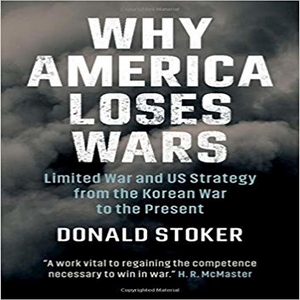Why America Loses Wars: Limited War and American Strategy From Korea to the Present

“Why America Loses Wars: Limited War and American Strategy From Korea to the Present”
Speaker: Stoker, D. (Atlas Organization)
Date: 22 October 2019
Speaker Session Preview
SMA hosted a speaker session presented by Dr. Donald Stoker (Atlas Organization) as a part of its SMA General Speaker Series. Dr. Stoker’s presentation focused on his book, entitled Why America Loses Wars: Limited War and American Strategy from Korea to the Present. He began by stating that the US has difficulty clearly winning and/or ending its wars because US political and military leaders do not know how to properly think about war. Moreover, these leaders do not understand the difference between war and peace, and victory is not valued or understood. The former is particularly critical because our adversaries do not appear to experience this confusion, which could lead to potential misunderstandings in the future. Dr. Stoker then explained that every US war fought since 1945 has been branded a “limited war,” even if it was not. He highlighted the problems with Robert Osgood’s and Bernard Brodie’s definitions of limited war and argued that Clausewitz’s definition provides a more concrete basis for analysis. Next, Dr. Stoker explained the danger of not understanding the political aim of a war and its effects, using the Korean War as an example. This example illustrated his point that changing the aim of a war changes the nature of that war and affects the other powers involved. He then discussed the key constraints associated with wars fought for limited political objectives, including the opponent’s political objective and the relative value of the objectives sought, both the internal and international political environments, and time. Moreover, he explained the “means problem” inherent in wars, which is particularly evident when considering atomic and nuclear weapons. He also highlighted several characteristics of good strategy, including an understanding of the opponent’s and your own centers of gravity and an awareness of the limits of military force. Next, Dr. Stoker discussed the problem of ending a war and securing the peace. He stated that limited wars are almost always ended by negotiations; however, almost no nation plans for negotiations or has a clear vision of what success would look like the end of a war. Moreover, wars are often not ended properly, and consequently, further conflict ensues at times. To conclude, Dr. Stoker explained why the terms “hybrid war” and “gray zone” are problematic, why one should study “limited war,” and how learning to think clearly and systematically about matters of war and peace are imperative when strategizing.
Comments